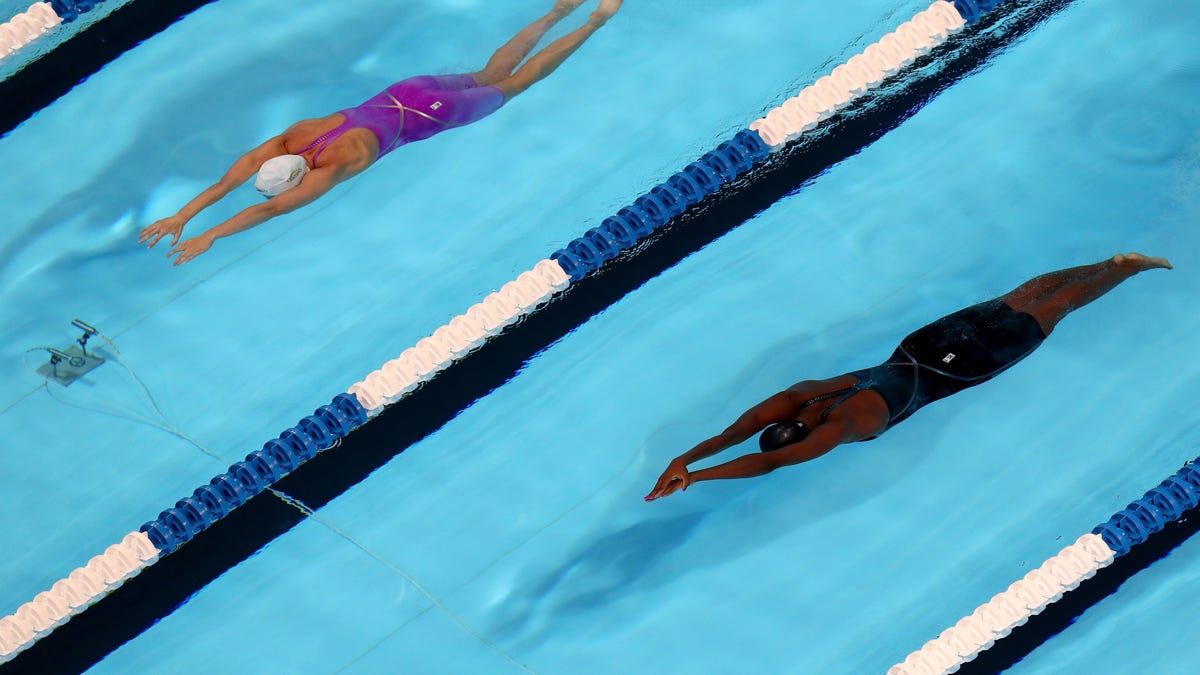
(Tom Pennington/Getty Images)
Problems with body image can be a huge deal for anyone. And for professional athletes, and especially female swimmers, it can be a unique issue. In a world where unrealistic beauty ideals are pushed throughout Hollywood, and where celebrities are photoshopped to surreal perfection, it's understandably hard to be in the public eye — while wearing a bathing suit.
U.S. Olympians Misty Hyman and Maya DiRado spoke to USA Today about their struggles with body image and eating disorders. Hyman battled bulimia for almost 10 years, beginning with her senior year in high school. She told USA Today that her eating disorder became a way of coping. "Part of it was my own insecurities; part of it was my own control, the sense of being in control or something I could control," Hyman said. "It wasn’t strictly just a body image issue or strictly just, ‘I’m trying to perform better.’ As an athlete I think there were other emotional challenges that I manifested into my eating disorder as a way of coping."
Maya DiRado told USA Today that she's known several swimmers who have struggled with eating disorders as well; it's an unfortunate link that she has with many of her teammates. DiRado explained, "I’m sure a lot of it has to do with being in a swimsuit every day, but I think also it seemed like they wanted control."
Luckily, the swimmers are able to support one another and help each other be stronger — not just physically, but emotionally as well. Hyman says that she has gotten to a place where she is able to appreciate her body for what it is, and find healthy outlets for her desire for control. In regard to her athletic body, Hyman explained, "Now I see that as something that’s beautiful and strong, and I celebrate that."
More From Teen Vogue
- 47 Awkward Celebrity Yearbook Photos
- Before Jennifer Lawrence and Taylor Swift Were Famous, They Modeled for Abercrombie—and We Have the Pics!
- 27 Must-See Celebrity Prom Throwback Photos
- Celebrity Hair Makeovers: Before and After Photos
- The Best Beauty Brands for REALLY Sensitive Skin
- 17 Products That Will Clear Up Your Skin—Fast
Maya and Misty aren't the only ones who have opened up about eating disorders. Seven-time Olympic gold medalist Amanda Beard has also been open about her 12-year struggle with bulimia.
“If anybody is struggling it makes them see that there are other people out there. It shouldn’t control your whole life,” Amanda told a group of college students. “I hope that people can listen to my story and see that I was able to overcome it and still achieve great things.”
Stories like this are not uncommon among athletes. And while eating disorders affect athletes in all sports, research has found that eating disorders are more prevalent in sports where lean bodies or low body weight is thought to provide advantage in their performance. In fact, despite how comfortable swimmers are known to be with their bodies, they are also said to be at high risk for disordered eating.
Want more info on how to help a friend who may be struggling with an eating disorder? Check out the National Eating Disorder Association and visit the Parent, Family & Friends network to learn more about how you can help a loved one on their road to recovery.
